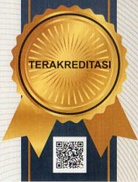Analisis Kebutuhan Model Problem Posing Berorientasi STEM
Abstract
This research is a descriptive survey to determine the needs of lecturers and students for STEM-oriented problem posing learning models that can activate students to ask questions so that students can learn independently and can improve their problem solving skills in calculus. This research sample were students who took Calculus and lecturers who taught calculus. The research instrument used an online needs analysis questionnaire with two forms of statements, namely statements containing qualitative data. The research object consisted of 156 students from Padang State University, Bung Hatta University and STKIP PGRI Padang, as well as 2 lecturers teaching from the three colleges. The results of data analysis showed that on the part of lecturers and students is needed this learning model. Based on this results shows that the importance of designing a multidisciplinary oriented problem posing (STEM) learning model to increase problem solving abilities
Keywords : Survey research, indicators of needs, level of need for problem posing model
ABSTRAK
Penelitian ini merupakan survey deskriptif untuk mengetahui kebutuhan dosen dan mahasiswa terhadap model pembelajaran problem posing berorientasi STEM yang dapat mengaktifkan mahasiswa untuk bertanya sehingga mahasiswa dapat belajar secara mandiri dan dapat meningkatkan kemampuan problem solving pada mata kuliah Kalkulus. Subjek penelitian adalah mahasiswa yang mengambil mata kuliah Kalkulus dan dosen yang mengajar Kalkulus. Instrumen penelitian menggunakan angket analisis kebutuhan yang dibuat secara daring yang memuat bentuk pernyataan kualitatif yang dikuantitatifkan. Sampel terdiri atas mahasiswa Universitas Negeri Padang, Universitas Bung Hatta, dan STKIP PGRI Padang berjumlah 141 orang serta dosen yang mengajar dari ketiga perguruan tinggi tersebut masing-masing 2 orang. Hasil analisis data diperoleh bahwa dari pihak dosen dan mahasiswa membutuhkan model pembelajaran problem Posing berorientasi STEM ini untuk meningkatkan kemandirian belajar dan kemampuan problem solving.
Kata kunci : penelitian survey, indikator kebutuhan model, tingkat kebutuhan model problem posing.
Full Text:
PDFReferences
Barbazette, J. (2006). Training Needs Assessment Methods, Tools and Technique. Pfeiffer.
Burhanuddin. (2013). Pene rapan Kalkulus Integral Pada Bidang Biologi. Jurnal Biology Education, 2(1), 8–13.
Creswell, J. W. (2012). Educational research : planning, conducting, and evaluating quantitative and qualitative research. In Pearson Education, Inc., 501 Boylston Street, Boston, MA 02116.
Dahlan, M. (2014). Kemampuan Problem Solving Materi Kalkulus I pada Mahasiswa Prodi Pendidikan Matematika FKIP Unidar Ambon. Bimafika, 5, 614–617.
Kartono. (2003). Aplikasi Matematika dalam Perencanaan Dan Pengendalian di Bidang Industri. Jurnal Matematika Dan Komputer, 6(1), 49–58.
Kaufman, R., & Gavora, M. J. (1993). Needs Assessment and Problem Solving: A Critical Appraisal of A Critical Reappraisal. Performance Improvement Quarterly, 6(2), 87–98. https://doi.org/10.1111/j.1937-8327.1993.tb00589.x
Khairudin, Suryani, K., Widyastuti, R., & Setiawan, A. (2018). Interactive Multimedia Learning on the Basis of Problem Based Learning ( PBL ) for Vocational High School ( VHS ) Students. International Journal of Engineering & Technology, 7(4.28), 104–108.
Khairudin. (2020). Kemampuan Awal Kalkulus Mahasiswa Pendidikan Matematika. Edukasi: Jurnal Pendidikan, 18(1), 50–60. https://doi.org/10.31571/edukasi.v18i1.1679
Khairudin, Suryani, K., Fauzan, A., & Armiati. (2020). Self Regulated Learning of Mathematics Education Students of Bung Hatta University. Journal of Physics: Conference Series, 1429, 1–8. https://doi.org/10.1088/1742-6596/1429/1/012003
Khoiri, A. (2019). Meta Analysis Study: Effect of STEM (Science Technology Engineering and Mathematic) towards Achievement. Formatif: Jurnal Ilmiah Pendidikan MIPA, 9(1), 71–82. https://doi.org/10.30998/formatif.v9i1.2937
Larson, R. (2009). Calculus: An Applied Approach (C. L. Brooks/Cole (ed.); Eighth Edi). Brooks/Cole, Cengage Learning.
León, J., Núñez, J. L., & Liew, J. (2015). Self-determination and STEM education: Effects of autonomy, motivation, and self-regulated learning on high school math achievement. Learning and Individual Differences, in review. https://doi.org/10.1016/j.lindif.2015.08.017
Moru, E. K., Qhobela, M., Wetsi, P., & Nchejane, J. (2014). Teacher knowledge of error analysis in differential calculus. Pythagoras, 35(2), 1–10. https://doi.org/10.4102/pythagoras.v35i2.263
Puspitasari, R. D., Herlina, K., & Suyatna, A. (2020). A Need Analysis of STEM-integrated Flipped Classroom E-module to Improve Critical Thinking Skills. Indonesian Journal of Science and Mathematics Education, 3(2), 178–184. https://doi.org/10.24042/ijsme.v3i2.6121
Rahmi, Mardiyah, A., & Juwita, R. (2017). Analisis Kebutuhan Mahasiswa Dalam Mengikuti Perkuliahan Aljabar Linear Elementer. Lemma, III(2), 1–7.
Ranti, M. G., & Budiarti, I. (2018). Kemampuan Pemecahan Masalah Mahasiswa pada Mata Kuliah Kalkulus Diferensial. Math Didactic: Jurnal Pendidikan Matematika, 4(2), 110–120.
Royse, D., Station-Tindall, M., Badger, K., & Webster, I. M. (2009). Needs Assessment. In Oxford University Press. Oxford University Press. http://www.joim.pl/pdf/MAZURv2n2.pdf
Saripudin. (2015). Model Pemblajaran Abad 21 (pp. 1–11). Jurnal Teknodik Vol. 19 - Nomor 1, April 2015.
Sarı, U., Alıcı, M., & Şen, Ö. F. (2017). The Effect of STEM Instruction on Attitude, Career Perception and Career Interest in a Problem-based Learning Environment and Student Opinions. Electronic Journal of Science Education, 22(1), 1–20.
Siahaan, T., & Sianipar, H. F. (2020). Peningkatan Kemampuan Pemecahan Masalah Mahasiswa pada Matakuliah Kalkulus Diferensial Melalui Model Problem Based Learning. MAJU, 7(2), 150–155.
Suryani, K., Khairudin, Widyastuti, R., Amelia, R., & Riska, S. M. L. (2018). Using Interactive Web-Based Learning Multimedia to Assess Competency Standards for Installing LAN Among Vocational High School Students in Padang , Indonesia. International Journal of Engineering & Technology, 7(4.9), 262–267.
Wardani, K. K., & Suparman. (2017). Analisis Kebutuhan Pengembangan Model Pembelajaran Kooperatif Teaching Game Team Berbasis Guided Inquiry. The 5Th Urecol Proceeding, February, 199–203.
Wiratomo, Y. (2018). Analisis Kebutuhan pada Model pembelajaran Project Base Learning. Titian Ilmu: Jurnal Ilmiah Multi Sciences, 10(2), 74–83. https://doi.org/10.30599/jti.v10i2.163
DOI: https://doi.org/10.32487/jshp.v5i2.1132
Refbacks
- There are currently no refbacks.
JSHP: Jurnal Sosial Humaniora dan Pendidikan
is licensed under a Creative Commons Attribution-ShareAlike 4.0 International License (CC BY-SA 4.0)





